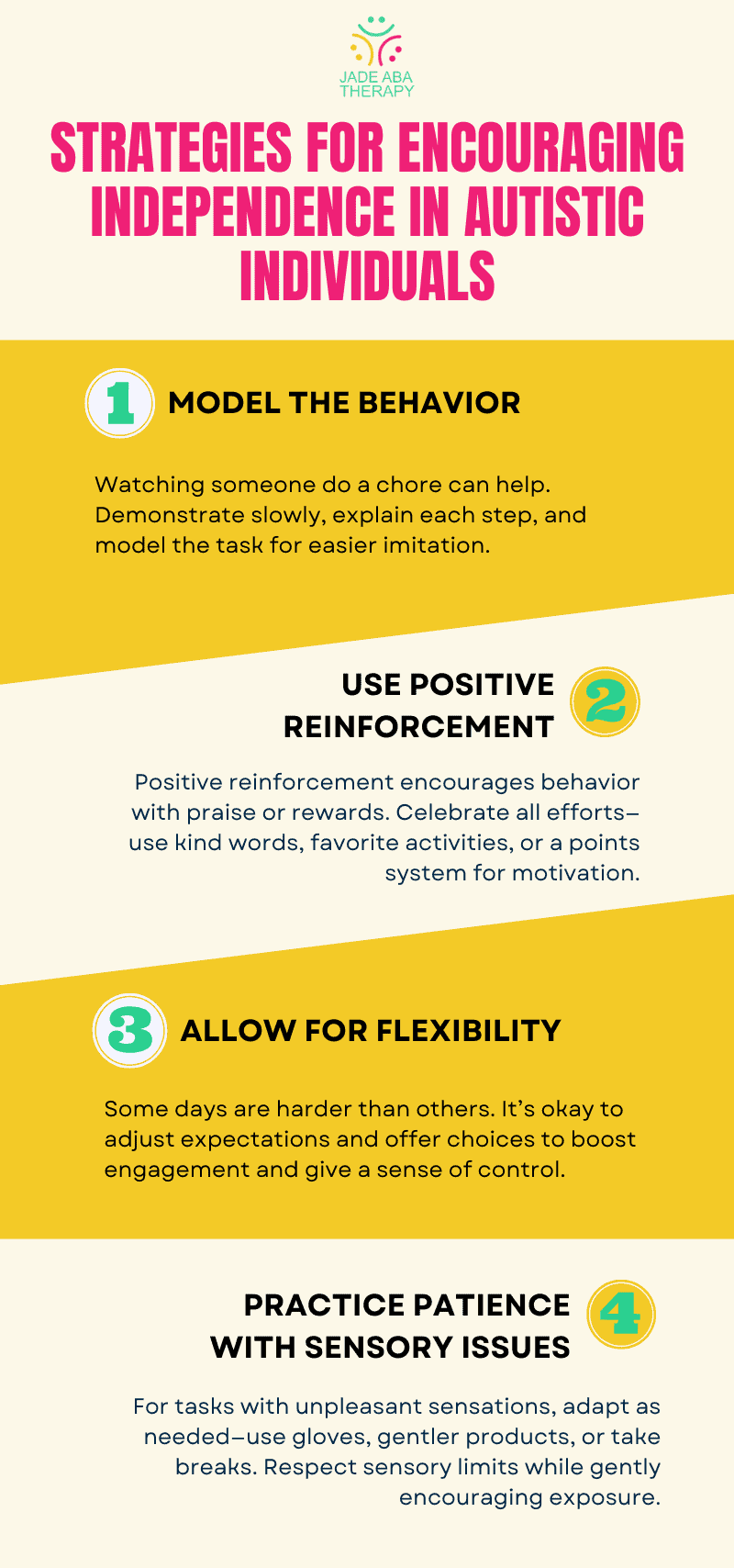For many people, household chores are part of daily life. These tasks might seem simple and routine, but for autistic individuals, managing household chores can sometimes feel overwhelming or confusing. Challenges related to executive functioning, sensory sensitivities, or differences in communication and motivation can make these everyday tasks more complicated than they appear.
Yet, learning to manage chores can be a powerful step toward greater independence, self-confidence, and participation in family life. With the right support, structure, and understanding, autistic individuals can develop skills to handle chores successfully and even find satisfaction in their accomplishments.
Why Household Chores Can Be Challenging for Autistic Individuals
Understanding the underlying reasons chores may feel difficult for autistic individuals is the first step toward providing meaningful support. Here are the key reasons why:
Executive Functioning Differences
Many autistic people experience challenges with executive functioning, which are the mental skills involved in planning, organizing, initiating tasks, and managing time.
For chores, this might mean struggling to break down a task into manageable steps or forgetting what needs to be done next. The process of deciding when and how to start a chore can feel overwhelming.
Sensory Sensitivities
Sensory issues are common in autism. The feel of certain cleaning products, the noise of a vacuum, the texture of laundry fabric, or the clutter of a messy room may create sensory discomfort or even distress. These sensitivities can discourage an individual from engaging in chores or completing them consistently.
Communication and Social Differences
Some chores require understanding verbal instructions or reading social cues about expectations, which can be challenging.
An autistic person might not intuitively grasp why chores are important or how often they should be done, especially if those expectations are communicated indirectly or inconsistently.
Motivation and Reinforcement
Motivation to do chores may vary. For some autistic individuals, abstract rewards like “helping the family” might not be compelling without clear, immediate reinforcement. Without motivation tailored to their interests or needs, chores can feel meaningless or frustrating.
Difficulty with Transitions and Changes
Chores often need to be done at specific times or after other activities. Shifting from one task or environment to another can be difficult, especially if a routine is disrupted. This can lead to resistance or anxiety around chore time.
Strategies to Encourage Engagement and Independence
Building skills in managing chores is a gradual process, and patience is key. The goal is to empower autistic individuals so they feel capable and willing to participate.
As such, here are some strategies worth considering:

However, even with support, challenges will arise. Here are some tips to navigate them:
- If an individual resists chores, try to understand the root cause. Are they overwhelmed, bored, or avoiding sensory discomfort? Breaking tasks into smaller parts or offering choices can reduce resistance. Also, avoid power struggles. Sometimes, stepping away and revisiting later works better.
- Visual schedules, alarms, or timers can remind individuals when it’s chore time. Consistent routines also help reduce forgetfulness.
- If chores are only done sporadically, ensure expectations are clear and consistent. Reinforcement should be immediate and meaningful to encourage regular completion.
- Sometimes skills learned in one setting don’t transfer easily to another. Practice chores in multiple contexts to help generalize skills.
Building Confidence and Celebrating Success
One of the most important aspects of helping autistic individuals manage chores is fostering a sense of accomplishment. Completing chores successfully supports self-esteem and independence.
Celebrate every milestone, whether it’s folding a single shirt or cleaning the entire kitchen. Use encouraging language that focuses on effort and improvement, not just the end result. Remind the individual how their contribution helps the family or household and that their efforts matter.
Over time, chores can shift from being seen as a chore to becoming a source of pride and autonomy—much like learning new safety skills can empower individuals with ASD. To explore this further, check out our article Learning to Identify Danger for Those with ASD.
Final Thoughts
Helping autistic individuals manage household chores is about more than just keeping the house tidy. It’s about fostering independence, teaching life skills, and promoting self-confidence. With patience, understanding, and the right strategies, chores can become manageable and even enjoyable.
Remember, every person is unique, so tailoring support to the individual’s needs and preferences is key.
Whether through breaking down tasks, using visual aids, incorporating interests, or applying ABA principles, small steps can lead to meaningful progress. At Jade ABA Therapy, we pride ourselves on delivering personalized, compassionate care that truly makes a difference for each individual we serve.
If you’re looking for expert ABA services in Maryland, reach out to us today. Let’s work together to support your loved one’s growth and success. Contact us now to get started!
Sources:





